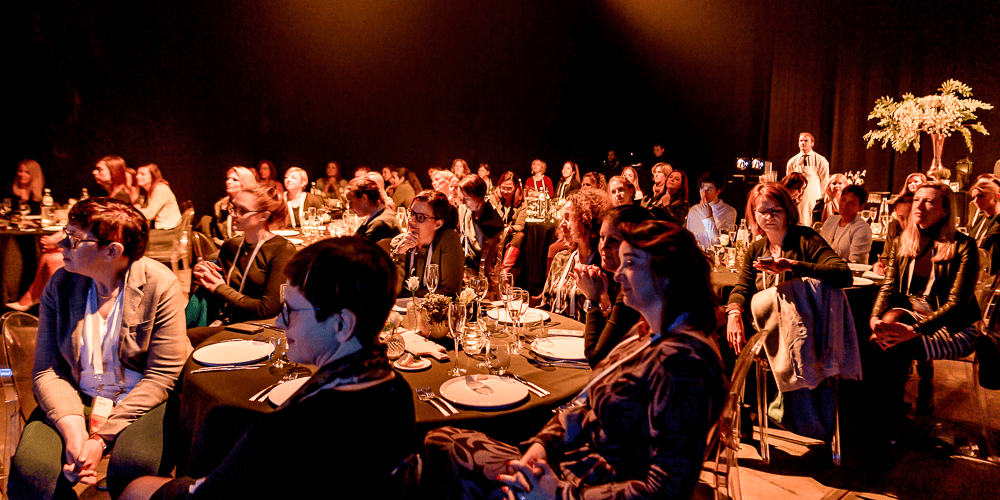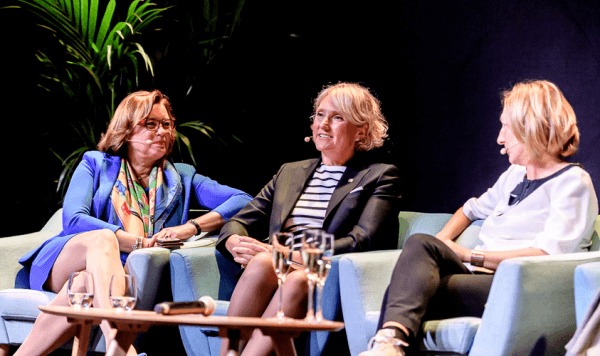The Dell Technologies Forum in Brussels was once again a success with inspiring keynotes from, among others, Patricia Florissi and futurist Nell Watson. For me personally, the Women in Tech networking lunch was one of the highlights. A particularly agreeable and instructive debate in which a panel of five top women shared their experiences with an audience of more than 70 women, all active in the digital sector.
Digital transformation, diversity, inclusion and corporate social responsibility are among my favorite subjects. Our organization and the organizations of our partners and customers should be a reflection of society. But there are still not enough women active in the digital industry. An initiative such as Women in Tech is ideal for sharing experiences. Many thanks to the ladies in the panel: Ingrid Gonnissen (Orange Belgium), Ruth Wachelder (Bechtle), Pascale Ameye (Wise), Dr. Sarah Steenhaut (Callebaut Collective) and Laurence Schuurman (Capgemini). The result was a fascinating discussion with a number of interesting conclusions.
As a woman you have to be the best in everything: work, home, mother, partner, …
You have to prove yourself more as a woman. Dr Sarah Steenhaut admits that it is a challenge every day. Her advice: don’t tackle this as time management, but as mind management. At work you focus on your work. At home you clear your mind and focus on your family. Not only physically but also mentally. Be in the moment!
Is business culture a problem? Pascale Ameye hopes that the culture in companies will change. The focus is still too much on a linear, ascending career. But at certain moments in life you should have the possibility to tackle it differently, to set different priorities. To me, this is not only about working part-time, but also about competences and preferences. Not every woman needs to become a team manager, especially if she loves her current job.

What experience has changed your vision?
Ingrid Gonnissen said that she – despite not having any technical training – decided to lead the technical department. A team of 300 technicians, mainly men! “It was a very positive experience and you also get respect. That is why I say: dare to change.”
Pascale Ameye found it very exhausting to adapt every time. At first she thought that she was the problem. But it had more to do with the branch. She then decided to look for other job opportunities. Her important advice: decide for yourself and stay true to your own values.
What was a turning point in your career?
Ruth Wachelder remembers her first job. Her manager asked her to become a team leader despite her young age and little experience. But he allowed her to make her own mistakes. One day she noticed that he never discussed with her in public. He gave his opinion afterwards at his office. “That was a very important lesson for me and I used it often in my further career.”
Ingrid lost her job at the age of 53. Although she saw it coming, this was obviously not a pleasant feeling. “But once you have expressed those emotions, you must turn over a new leaf,” she says. Networking is therefore very important. As soon as your network hears the news, people automatically contact you to see if they can do anything for you. Dare to ask for advice, but surround yourself with good counsellors. And, as Ruth Wachelder observed, make a value proposition of yourself: what can I do and what can’t I. Very important.
A meeting with the CEO was a turning point for Sarah. He first made her feel that she, as a young consultant, couldn’t teach him anything. However, Sarah wouldn’t be intimidated, kept believing in herself and started to debate. After that meeting his respect for her grew.
Personally, I think you have to draw up a business plan for yourself. And map what you can and can not do, or – like Sarah what you do not want to do. Then you have come a long way. Us women we also have to change our mindset. In a vacancy, a man who has 40% of the required skills will say: I can do that. A woman who meets 90% agreement of the requirements in a job description will say: probably not for me. “But as a manager, it is also our job to encourage and motivate those women to still apply for the job,” adds Ruth Wachelder. Realizing and accepting that you do not need to have all competencies is an important attitude.
What is your biggest learning?
Ensure diversity. A team with like-minded people does not work. Never look for a second ‘me’. Ruth added to this that diversity is not just a thing between men and women. It is also about young and old, about all characters of the spectrum. Ensure a healthy mix of so-called blue, yellow, green, red personalities in your team. For example, Ingrid has candidates interviewed by four different personalities in the company. That gives a better overall picture.
She also encourages to look for new profiles: “Why does IT always look for people with IT training? Why do they always need to have experience in the sector? It is even enriching to search outside those paths.”

What can we do for the next-gen ladies in ICT?
Supporting each other is very important. For example, Laurence Schuurman told me that she changed her mind when I told her that I believed in her and that she would live up to her dream. You have to create a kind of sisterhood, to network more and to endorse each other, as men do. Dare to help female colleagues, and also ask for help if needed. That obviously does not exclude men. I have had more men than women as a mentor in my career.
To conclude, the five ladies each had a brief advice for the all the IT-ladies:
Ingrid Gonnissen: Dare! And always be a woman.
Ruth Wachelder: Have fun in and at work
Pascale Ameye: Pick your own battle
Sarah Steenhaut: Believe in yourself
Laurence Schuurman: You have nothing to lose (it’s just a job)
And my advice fits in with this: Be true to yourself in all circumstances. That makes you authentic!